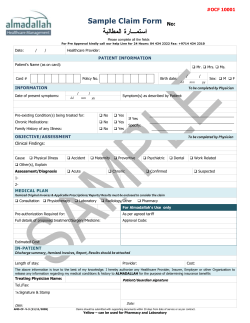
Pharmacists January 2004
Pharmacists January 2004 Pharmacy •The Art of preparing and dispensing drugs. •A place where drugs are sold; a drugstore. • History of Career • Expected Duties and Physical Demands • Training and Education • Personal Qualities • Skill Measurement • Code of Ethics • Earnings/Benefits • Future outlook • Bibliography • Dates back to medieval times with priests • Origin of the word “pharmacy” come from the Greek • As much as 80,000 years ago people of Paleolithic period were interested in flora. • It is hard to say when it started exactly – It existed in a rudimentary form long before the word existed. • Combining different agents(compounding) was considered an art form by priests and doctors. • First known chemical process was carried out by the artisans of Mesopotamia, Egypt, and China. • Theories often involved magic, but developed mathematical, astronomical, and cosmological ideas. • The first culture to consider ideas scientifically was the Greeks. – Made logical speculations rather than relying on myth. • Pharmacy began to develop as a profession separate from medicine in the 18th century. – 1821 the first school of pharmacy was established. • Industrial Revolution – Rapid change from hand methods to machine methods of production that characterized industrial revolution. • Large scale drug manufacturing was big in society;many machines and patents • Declining art of Apothecary: – Industrial Revolution had an impact of every aspect of pharmacy. • 1st lead to creation of new drugs. – Drugs many pharmacists couldn’t produce • 2nd many drugs could be produced more economically & with better quality. • 3rd the industry assumed responsibilities for the quality of medication instead of individuals. • The Community Pharmacy – 19th century didn’t see the end of compounding. • Its estimated the 80% of prescriptions dispensed in 1920’s were still compounded. – They used chemicals purchased to make own prescriptions. – Called to provide first aid and medicines for common aliments Ex: Burns, frostbite, poisoning etc. • Graph for 50 years Between 1920-1971. Dispensing and compounding of medications 1 2 3 • Now they need to know things like shelf life and effect of exposure to light, – Judging reliability and reputation of manufacturers. • Compounding today is on the rise – People are realizing the benefits – Pharmacists are going back to it just for the love science and interests. Graphs People going int Pharmacy in 1947 1 2 People going into pharmacy in 1988 People going into pharmacy in 1973 1 2 1 2 • The Work – Prepare and dispense drugs prescribed by doctors. – Advise doctors, patients, and other health care professionals on proper dosage and possible side effects. • They must know what’s in the drug, how it works, and how it affects people. • Purchase medical supplies • Answer customer questions • Go with doctors and hospital staff on rounds • Advise patients on medical equipment and over-thecounter medication • HELP PATIENTS GET WELL • May work in a hospital, clinic, or drug store • Constantly learning and studying about properties & side effects of new drugs. • Communicate with doctors & patients • Most work a standard work week • Best job opportunities go to people with best grades – Lower grades will get you a job, however, maybe part time • Companies want people who graduate at the top of the class. • Fierce competition Education • Bachelor’s degree is being phased out – Instead schools offer a doctor of pharmacy (PharmD). • Bachelor’s degrees will not be awarded after 2005 EducationClasses • College Prep – English – Math – Science – Good written and verbal communication skills EducationClasses • College requirements – 2 years of pre-pharmacy courses – 4 years of professional programs leading to PharmD. • Courses include Biology, Chemistry, Calculus, English, Speech and General Education. • Electives – Community pharmacy, hospital pharmacy, marketing, pediatrics and geriatrcs. Personal Qualities • Have a good memory • Enjoy learning about new medications & treatments • Be trustworthy & detail oriented • Good communication skills • Good problem solving abilities • Enjoy people Personality Qualities Personality Matches Personality Misses Analytical Creative Detailed Emotional Focused Disorganized *I want some one who is kind and caring, who shows an interest in me and my well being. Skill Measurement • Board Exams – NAPLAX – Federal Law Exam – Each States test • 30 hours of CEU’s every 2 years • Renew State License every year • A pharmacist respects the covenantal relationship between the patient and pharmacist • They promote the good of every patient in a caring, compassionate, and confidential way • The place concern for the well-being of the patient • They respect the autonomy & dignity of each patient. • They act with honesty & integrity in professional relationships • They maintain professional competence • They respect the values & abilities of colleagues and other health care professionals • They serve individual, community, and societal needs • They seek justice in the distribution of health resources – Very similar to many peoples morals. Earnings/Benefits Average Earning $69,440 Average Hourly Rate $33.39 California PharmacistStaff average-$90,000-100,000 per year Manager- $100,000-150,000 Owner - $100,000-??? Pros Cons Good Salaries Long Hours Wide variety of Careers Options Potential Restlessness • INCREASING NEED!!!!! 2000 workforce 217,000 2000-2010 Growth Rate 24.3% Other Places of Work • • • • Armed Services Community pharmacy Drug Research & Development Sales & Marketing Armed Forces • • • • Air force Army Coast Guard Navy *You need a 4 year college degree in pharmacy and a state license to practice pharmacy. • http://www.iit.edu/departments/csep/Public WWW/codes/coe/American%20Pharmaceu tic… • http://www.lindsaydrug.com/newhist.htm • http://usa.cx.bridges.com/student/DisplayAr ticle.do?dt=Career+Information&dn=Pharm acist • • • • http://www.uspharmd.com/rxpharmacist.htm http://www.uspharmd.com/rxpharmacist2.htm http://www.uspharmd.com/rxpharmacist3.htm http://www.pharmacists-recruitmentint.com/PharmacitsRecruitment/Professinal_Requirements.html • Kevin House-interview • http://www.op.nysed.gov/pharm.htm • http://www.ask.com/-pictures
© Copyright 2025





















